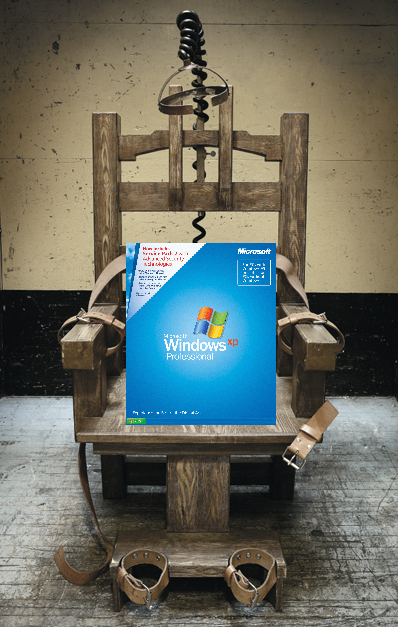I'm sticking with Windows XP

You've heard it all before -- the bell tolls for Windows XP. The governor isn't calling to give it a reprieve -- Microsoft is officially declaring it end of life for system OEMs on June 30. On April 14, 2009, mainstream support dies. Enterprises with extended support contracts can keep trundling along until April of 2014.
Does that mean everyone should go straight to Vista right now? Hell no. I certainly am not.
Look, let's face it, Windows XP is now in the prime of its life, like an older pro golfer who is now at the best of his game. He's figured out what his quirks and weaknesses are and how to compensate for them.
Windows XP with SP3 integrated is about as solid a Windows desktop OS as we've ever gotten -- it runs all the apps I want, including Office 2007, all the modern browsers, and if you're a gamer, it still has everything you need.
Other than for software and integrated testing, there is absolutely no compelling reason for me to use Vista for my own personal use. None. Zero. Nada. Of course, there are a number of challenges to drawing a line in the sand in this way.
If you buy a new PC, you're gonna get Vista -- that is unless your OEM of choice offers Windows XP through some sort of limited time "downgrade disk" program. And realistically, they can only do this for you through the end of January 2009, which is the real drop dead date for license availability for system builders -- or if you are a large company with a Microsoft Enterprise Agreement with volume licenses and can use downgrade entitlements.
Many new PC's that are Vista preloaded are able to use XP, but there are a number of situations where you might encounter driver support issues, where your OEM may not supply drivers itself for XP for a particular system model.
However, this can usually be rectified by visiting the chipset manufacturer's website directly, if you happen to know what type of hardware is in the machine -- a Linux boot disk, like System Rescue CD or Knoppix will easily tell you via the dmesg kernel output or the lsmod command what drivers are in use.
While it's certainly going to be a big pain in the rear for consumers, XP ending its OEM support life is not a problem for me. For my own home computing needs, I mostly buy inexpensive, generic x86 boxes that I run Server and Desktop Linux OSes on, and I use virtualization and hypervisor software stacks, be it running on VMWare Server 2.0, Sun xVM VirtualBox, Windows Server 2008 Hyper-V or ProxMox to abstract the OS from the platform.
Virtualization has effectively neutralized the driver support problem, because in a VM, you can present any number of virtual drivers to the guest, and the installation of virtualization tools will accelerate the performance of paravirtualized systems.
On systems that are compatible with the newer bare metal virtualization technologies, such as KVM and Parallels Server, such paravirtualization tools aren't even necessary. I predict that in the future, maybe within five years, all OSes will be virtualized, regardless of whether if it is server-based or desktop-based. With VT-X, VT-D and AMD-V technology built onto every x86 chip, this will eventually be the preferred method for running all environments.
Virtualization geeks aren't the only folks looking at VM technology to extend XP's life, however. Desktop virtualization for enterprises is very real -- just take a look at what Citrix, VMWare, Sunand Qumranet are doing with their products -- and believe me, this stuff isn't primarily targeted for Vista, it's targeted for XP.
With desktop virtualization, you can toss your PC entirely and go with a thin client terminal, and take advantage of virtual infrastructure high availability and the economies of scale that come with server and desktop consolidation and the ease of centralized management.
Are you sticking with XP, no matter what pain points you need to go though in order to dodge the Vista bullet for as long as possible? Talk back and let me know.
